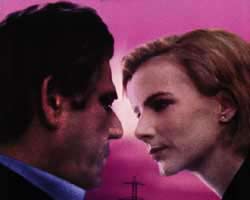
This is a bit after the event (Blame it on St Ives), but the other week we saw Stephen Poliakoff’s
Glorious 39 at the BFI, followed by a Q&A with the writer/director, as well as cast members Romola Garai and Bill Nighy.
(I’ve since lost the notebook in which I was furiously scribbling during the Q&A, so unfortunately I’ll have to rely on my addled memory for what was said.)
Glorious 39 is Poliakoff’s first film for the cinema in more than a decade. He said he hadn’t planned to stay away that long, but enjoyed the creative control he was given while working in TV. Since the success of recent work like
Gideon’s Daughter, he’s been waiting for the right story to come along for his return to cinema.
The film is an atmospheric thriller set around an upper-class family – headed by MP Alexander Keyes (Nighy) – on the eve of World War II. Anne (Garai), the family’s adopted daughter, finds her life threatened when she stumbles upon what seems to be a conspiracy by pro-appeasement activists to prevent Britain being drawn into the war.
However, the mystery deepens when Poliakoff raises the possibility that Anne could be an ‘unreliable narrator’ and imagining the whole thing. The events of the film are seen almost entirely from her perspective, which takes on a nightmarish quality that suggests she could be suffering from paranoia.
A few things in the script don’t quite add up, but it’s a complex and cinematically rewarding film. It’s more than a little Hitchcockian in the way it draws an ‘innocent’ into a world of danger they struggle to comprehend. While there aren’t many thrills and spills, the atmosphere and imagery are effective and the outcome remains uncertain to the very end.
Afterwards, Poliakoff spoke about how he came up with the Keyes family’s story to embody the vital struggle that was taking place in political circles as war approached. Even though we know the appeasers failed, he sought to create tension by dropping us into history and making us identify with a character at the heart of the mystery who doesn’t know how it’s going to turn out.
He also uses the theme of being betrayed by one’s family to reflect what happened to those who were suddenly persecuted by the Nazis in communities where they had previously felt secure. Throughout the film, imagery evocative of the Holocaust raises the spectre of what is about to happen across Europe.
Naturally, Poliakoff’s Jewish heritage makes this an even more vital theme; he claimed that most people remain unaware of how close the UK came to reaching an agreement with Germany that would almost certainly have led to the creation of a Vichy-style government in the UK and the eventual application of the Nazis’ murderous agenda.
From a screenwriting point of view, Anne also offers a useful lesson in how you can give your characters aspects that allow you to explore the theme of your script in a dramatic but natural way. She is seen throughout as something of an outsider; as well as being adopted, she’s also a film actress – a less-than-respectable profession that marks her out as the black sheep of the seemingly upright family. This makes her increasingly vulnerable when it seems the rest of the family is closing ranks against her.
In terms of structure, Poliakoff also stressed the importance of the present-day framing section that bookends the film. He included it to remind the viewer that this vital moment in our history occurred within living memory. He also wanted to draw a link to the 1930s as a living period, rather than the cosy fictional ‘Jeeves and Wooster’ world that drama set in the period often defaults into.
I’d never really engaged with Poliakoff’s work before, so I can’t judge
Glorious 39 in the light of what came before it. However, despite a few glitches and a slightly bum-numbing running time (129 minutes), I enjoyed it as a fairly engrossing if slow-moving thriller - thanks in no small part to Romola Garai's performance.
Interview with Stephen Poliakoff (Writers and Artists)Preview of Glorious 39, focusing mostly on production (Screendaily)Set visit (4-min video, BBC)Cast and crew interviews (6-min video, BBC)






